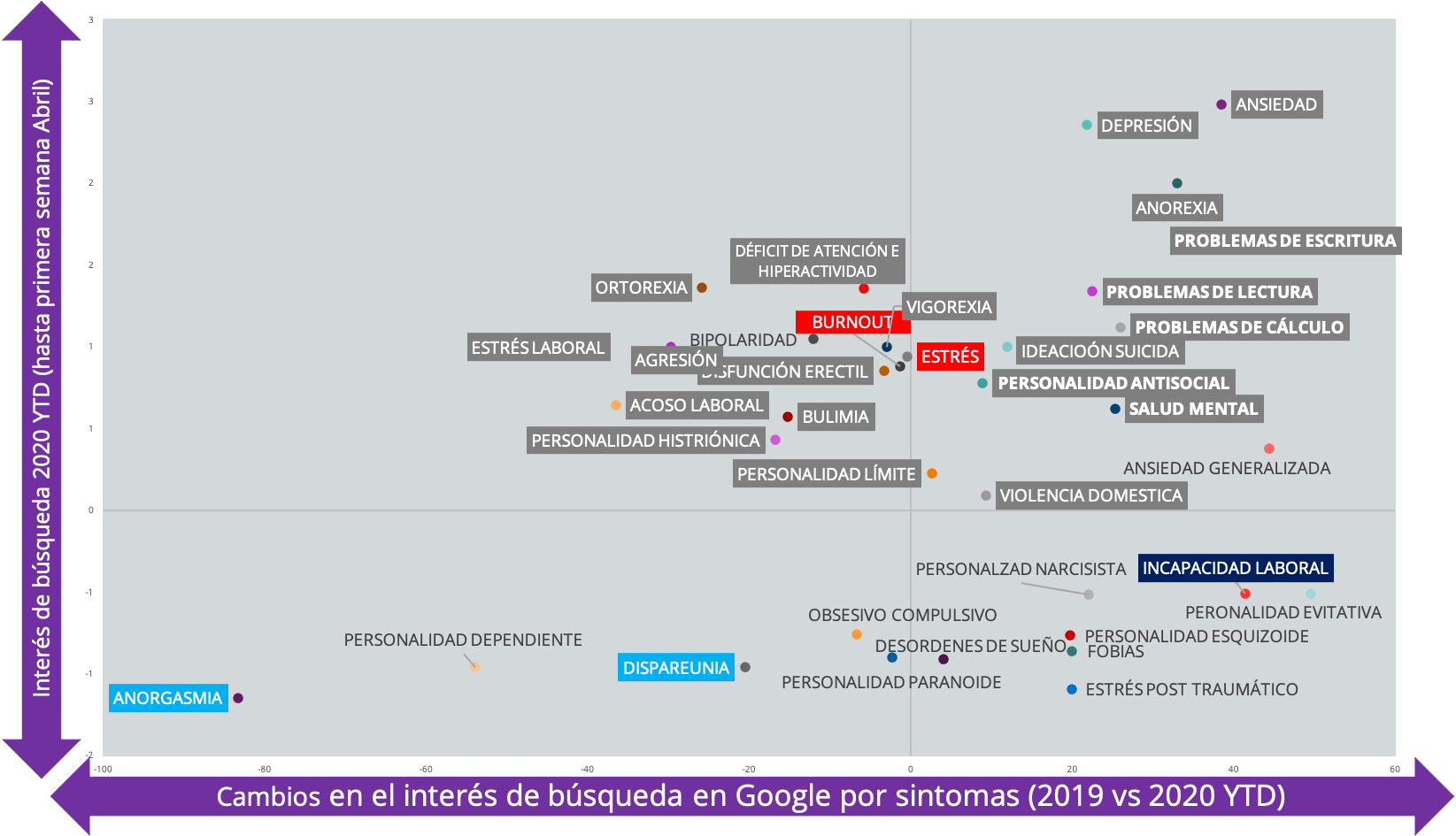Nutritional supplements and vitamins are beginning to play a more proactive, rather than reactive role in the post pandemic daily life, as shown by the trend, directing the narrative of various digital segments. As mental health enhancers and superpower givers, vitamins and supplements are relied on to give emotional resistance, tolerance to stress, improve memory, intelligence, attention and creativity. In this blog we share the results of our most recent research using natural language processing and machine learning strategies, which are integrated in our methodology CI360, to derive insights from social data.
NOTE: This blog is not a nutritional suggestion or a product recommendation. Its purpose is to demonstrate the power of the following aspects:
-
- A methodology: Natural Lenguage Processing
- A technology: The use of Machine learning to find insights from social data (blogs, news, networks, search engines, reviews, etc.)
THE DIGITAL NARRATIVE ABOUT STRESS
In the first stage of the pandemic (first semester 2020) the incidence of searching for psychological and psychiatric symptoms on the internet, exhibited a 47% increment compared to the same period in 2019. Among the most sought signs, stress and other feelings of emotional tension were the protagonists (see graph below, red).

For years now, stress has been a symptom, an illness, an excuse and a subject matter of conversation. A socially accepted explanation for the consequences of modern life. The narrative of the first semester of 2021 changes in relation to the same period of the previous year in Colombia and Mexico, particularly due to the appearance of new topics of interest and to the focus on active principles, as well brands and products containing them. The digital narrative on stress can be analyzed from supply and demand as shown in the table below:
|
First semester 2021
(Compared to the same period on the previous year) |
Demand
(How the consumer reacts) |
Offer
(What brands are offering) |
| Narrative |
Conversation Volume: 6,321,512
(+ 34%)
|
Threads: 545
(+ 22%)
|
| Territories |
Ingredients: 1,827
(+ 12%) |
Products: 829
(-9%) |
| Rhetoric |
Threads: 545
(+ 22%) |
Brands: 212
(+ 5%) |
The offer is not developing at the same rate as is the demand and even though this is how brands grow, generally speaking, the categories are being developed 8% less in the conversation, compared to the previous year.
In text analytics, the SVD (Singular Value Decomposition) algorithms allow finding similarities between themes and concepts to generate clusters that are represented in graphs.
The graph below shows how the digital narrative has positioned "Cortisol Control", as the new goal, giving relevance to a whole category: "Adaptogens" thereby positioning "Ashwagandha" as much stronger competitor in the digital conversation about supplements than it was in 2020.
%2011.04.28%20a.%C2%A0m..png?width=369&name=Captura%20de%20Pantalla%202021-06-26%20a%20la(s)%2011.04.28%20a.%C2%A0m..png)
# 1: A molecular consumer
The consumer seems to be looking for the molecular origin of his problems and goals. The conversation about stress now revolves around one of its most cited biological substrates: the hormone cortisol.
Looking for a molecular solution or explanation is not new in consumer behavior. This trend explains how skincare brands such as The Ordinary and Good Molecules, have strategize their brand growth through the offer of pure active ingredients instead of sophisticated formulations of skincare creams and serums.
This trend represents a risk, since parallel to the search for "pure active principles”, appear “concentrated ingredients” thus creating a bias in the choice for products with higher concentrations, regardless of how it may impact overall health.
# 2: Burnout from discipline-based formulas
For certain digital segments, breathing, yoga and reading may have been a first step towards stress management, although at this point it no longer seems sufficient. A dietary supplement that supports stress management seems more attractive and that is how the concept of ADAPTOGENS has developed in the digital conversation, as a support for the body to regulate the hormonal response to stress.
As the conversation about adaptogens grows, the conversation about yoga, mindfulness and exercise tends to decline, in those segments that produce and consume content related to stress.
# 3: Less spiritual but connected to Eastern cultures and Nature
Although solutions based on spiritual discipline (yoga, meditation, breathing) seem not to be fast and effective in some segments, the leading supplements in the conversation have some characteristics in common:
They maintain the fascination for the Eastern cultures. We have talked about this phenomenon before, the Latin consumer wants to understand and get culturally involved with the Eastern cultures and through yoga, decoration and other disciplines they have begun to do so. Chinese medicine and Ayurveda are part of this connection. The fastest growing supplement of the adaptogens is ASHWAGANDHA, a dominant root in Ayurveda theory.
There is a trade up against Valerian and Passion Flower. In the Western cultures -and culturally speaking- the herbal solutions of choice for anxiety and stress, has been Passion Flower and Valerian. The intention to search for topics around these ingredients has decreased since October 2020 (-23%). This coincides with the growth of Ashwagandha as a topic of conversation. In the mind of the consumer there is no room for so many trends, so the growth of a particular topic implies the deterioration or loss of narrative pressure of another.
Maintains an interest for herbal remedies. The intention to seek solutions such as Rhodiola and Ashwagandha indicates that the consumer still relies on the natural as opposed to the conventional when trying to cope with stress in the waking hours.
CI360 is a powerful mechanism for ingesting, integrating and analyzing textual data from social data. As a methodology it is based on natural language processing to detect trends in social data.
Tell us if you are interested in learning more about the methodology, get in touch with one of our consultants:
América del Sur
México y Centroamérica